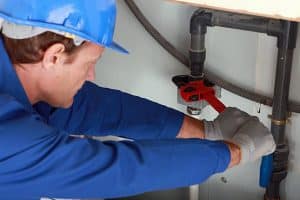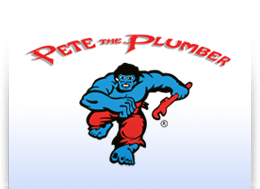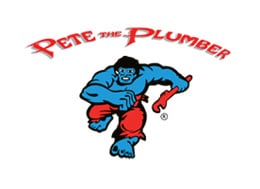
The banging, knocking or, some might say, “thwacking” sound emanating from the pipes when you turn the water on may make you jump. After a while, it might just drive you crazy.
But don’t fret – the plumbing system is not just about to pack up and there is often a simple explanation and a relatively simple fix for the problem.
Before you call your plumber in a panic, take a read below and see if you can troubleshoot your issue.
Why are my water pipes making a banging noise?
The first thing to do when troubleshooting is to make a note of when the banging noise occurs. There could be several different “triggers” for the noise.
Generally, you will hear the noise when you do one of the following:
- Run the hot water
- Run the cold water
- Shut off the cold or hot water
A banging noise may also occur randomly, day or night.
The type of piping will affect your noise levels – copper pipe is generally noisier than plastic piping. Most banging pipe problems involver copper pipes.
Banging is also more common in hot water pipes than cold water ones because they expand and contract the most.
How can you stop your pipes from banging?
Stopping the banging noise from your pipes may involve a quick fix – or some major “surgery”. It depends on the cause and the accessibility of pipes.
Loose pipes in the wall may be the reason for the sound. The bad news is that if the pipes are all hidden behind drywall, you’re probably just going to have to live with the problem unless you’re prepared to start opening walls.
This might be an option if the noise really is driving you crazy but, of course, you will need to call the professionals for that.
The good news is that if you can see the pipes, you may be in luck.
Let’s assume that no drywall needs to be removed and the problem can be assessed from the visible water lines in your home.
Check all of the lines first. Gently push and pull visible pipes to see if they move. If any sections of pipe move when you lightly push them, mark them to come back to later.
You need to prevent water pipes from touching the surrounding building materials by providing support with every one-foot or so and at every change of direction. Also, any water line that passes through a hole should be supported.
How to secure loose plumbing pipes
You’ll need some plumbing straps or clips for this. Make sure you get the right size clips. Use half-inch or three-quarter-inch clips as required.
If the pipes are copper, use either copper straps or plastic. If the pipes are plastic, stick with plastic.
Install the clips every foot or so where you’ve marked the pipes. It’s best to err on the side of caution by installing more than code might require. This will give you greater peace of mind and, besides, the straps or clips are relatively cheap so it won’t break the bank.
In particular, pay attention to the hot water lines. Just remember they’re hot when you’re adding the straps and don’t burn your hands!
While copper pipes more commonly make noise, a section of plastic pipe that isn’t well supported by clips may also thwack.
What is water hammer?
If you’ve applied the above fix and you’re still hearing a banging noise from your water pipes, it still doesn’t mean that your plumbing system is about to pack up.
If the noise happens when a household appliance such as a washing machine or dishwasher shuts off, it could be due to water hammer.
Water hammer is a phenomenon that occurs when the flow of water in your pipes is abruptly stopped.
When the cold or hot water is shut off, the pressure resonates through the pipes, causing them to bang against anything in the vicinity, such as nearby studs, joists or other water pipes. This is the hammer sound that you hear.
Solenoid-triggered valves are often used in dishwashers, washing machines and water softeners. These shut off almost instantly and this is why these appliances are particularly associated with water hammer. Regular household faucets don’t usually don’t cause noisy pipes because the shutoff is more gradual.
Water hammer is more technically referred to as hydraulic shock. However, the loud bang or series of bangs or shuddering noises is normally more of a shock to a homeowner than the plumbing system.
Don’t panic. The sound is unlikely to damage your pipes and there is a relatively easy fix.
How do you stop water hammer?
With most plumbing issues, prevention is better than cure.
A water hammer problem can be fixed and prevented by creating a space filled with gas or air before the outlet to absorb the buildup of pressure.
Traditionally, in older Calgary homes, an air chamber was created with a capped piece of vertical pipe placed near the outlet.
A better solution these days is generally to use a water hammer arrestor. This features a sealed and pressurized chamber containing a lubricated and rubber-gasketed piston, which prevents water from remaining in the arrestor.
The use of an arrestor creates the necessary space for the water to move when there is a shock but the internal piston ensures that water is moved out afterwards. This addresses the main problem experienced by traditional air chambers.
What tools are needed to fix water hammer?
If a water hammer arrestor was not installed when the plumbing system was designed and fitted during construction, it can be added afterwards if you have few basic plumbing skills.
You can purchase a water hammer arrestor at any home centre. The arrester should be located as close as possible to the solenoid valves on appliances in your home.
If you’re a dab-hand with plumbing and can do this yourself, you’ll need the following tools:
An adjustable wrench
Plumbers tape
Soldering torch
Tube cutter
Are your water pipes making banging noises?
There are other causes of banging water pipes apart from this described above. We’ve only covered a couple of causes with simple fixes.
If your noisy water pipe problem won’t go away, it could be due to water pressure issues, sediment build-up or another reason.
Say goodbye to banging water pipes
To troubleshoot any plumbing issue or for ball-park pricing, contact Pete the Plumber through our online form or give us a call at (403) 257-1766.

